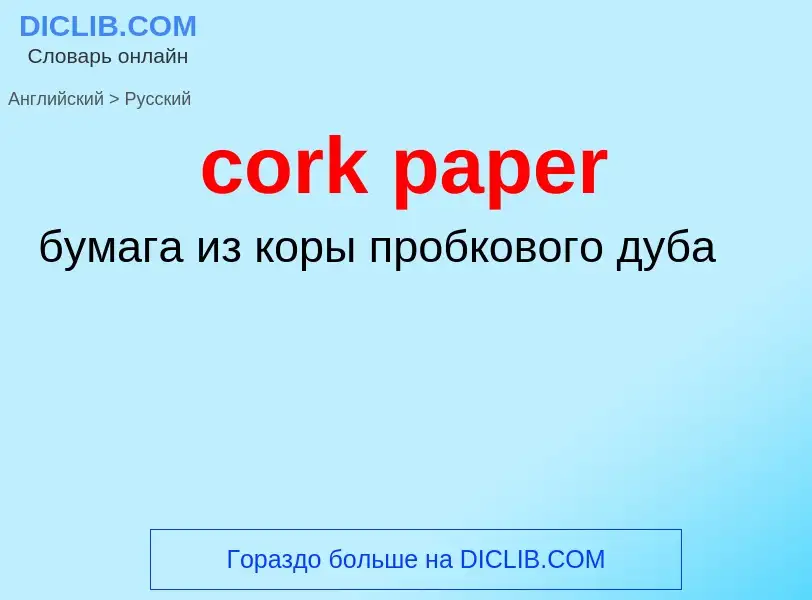Traducción y análisis de palabras por inteligencia artificial ChatGPT
En esta página puede obtener un análisis detallado de una palabra o frase, producido utilizando la mejor tecnología de inteligencia artificial hasta la fecha:
- cómo se usa la palabra
- frecuencia de uso
- se utiliza con más frecuencia en el habla oral o escrita
- opciones de traducción
- ejemplos de uso (varias frases con traducción)
- etimología
cork paper - traducción al ruso
[kɔ:k]
ботаника
вторичная кора
вторичный луб
медицина
пробка
Смотрите также
прилагательное
общая лексика
пробковый
существительное
[kɔ:k]
общая лексика
кора пробкового дерева
пробка
поплавок
кора пробкового дуба
ботаника
лубяная ткань
луб
синоним
глагол
[kɔ:k]
общая лексика
закупоривать пробкой
(часто cork up)
сдерживать
сдерживаться
скрывать чувства
прятать
держать под колпаком
замком
не показывать
мазать
разрисовывать лицо жжёной пробкой
подводить брови жжёной пробкой
затыкать пробкой
мазать жженой пробкой
синоним
Definición
)
Wikipedia

Cork is an impermeable buoyant material, the phellem layer of bark tissue that is harvested for commercial use primarily from Quercus suber (the cork oak), which is native to southwest Europe and northwest Africa. Cork is composed of suberin, a hydrophobic substance. Because of its impermeable, buoyant, elastic, and fire retardant properties, it is used in a variety of products, the most common of which is wine stoppers. The montado landscape of Portugal produces approximately half of the cork harvested annually worldwide, with Corticeira Amorim being the leading company in the industry. Cork was examined microscopically by Robert Hooke, which led to his discovery and naming of the cell.
Cork composition varies depending on geographic origin, climate and soil conditions, genetic origin, tree dimensions, age (virgin or reproduction), and growth conditions. However, in general, cork is made up of suberin (average of about 40%), lignin (22%), polysaccharides (cellulose and hemicellulose) (18%), extractables (15%) and others.


![''[[Quercus suber]]'' (cork oak) bark, Portugal ''[[Quercus suber]]'' (cork oak) bark, Portugal](https://commons.wikimedia.org/wiki/Special:FilePath/1-Arraiolos-0050.jpg?width=200)
![High-speed [[air-gap flash]] image of a champagne bottle being uncorked High-speed [[air-gap flash]] image of a champagne bottle being uncorked](https://commons.wikimedia.org/wiki/Special:FilePath/Champagne uncorking photographed with a high speed air-gap flash.jpg?width=200)
![stone]] or [[ceramic]] [[tile]]s stone]] or [[ceramic]] [[tile]]s](https://commons.wikimedia.org/wiki/Special:FilePath/Cork bathroom flooring.jpg?width=200)
![Cork extraction near [[Aracena]], Spain Cork extraction near [[Aracena]], Spain](https://commons.wikimedia.org/wiki/Special:FilePath/IAPH Saca del corcho.jpg?width=200)
![LS]] of cork. LS]] of cork.](https://commons.wikimedia.org/wiki/Special:FilePath/RobertHookeMicrographia1665.jpg?width=200)
![stoppers]] for wine bottles stoppers]] for wine bottles](https://commons.wikimedia.org/wiki/Special:FilePath/Wine corks in variety, Rostov-on-Don, Russia.jpg?width=200)
